US risks being ‘front run’ on Bitcoin reserve by other nations: Samson Mow
June 3, 2025
JAN3 founder and uber Bitcoin maxi Samson Mow finds it absurd the US government is yet to start accumulating Bitcoin for its strategic reserve after giving the rest of the world the blueprint.
“It would be incredibly ironic and unfortunate that the US, which took bold steps, and the Trump administration, which took bold steps to push this forward, gets front-run by other nation states that are inspired by their actions,” the Chinese-Canadian Bitcoin entrepreneur tells Magazine.
It’s been three months since Trump signed the executive order, and Mow says the US “has to start” acquiring Bitcoin this year. “The risk is that the US is front-run by Pakistan, and they were on stage at Las Vegas saying, ‘well, you inspired us to start,’” the 13-year Bitcoiner explains.
Bilal Bin Saqib, head of Pakistan’s crypto council, announced at Bitcoin 2025 Las Vegas on May 28 that the country is moving to establish a strategic Bitcoin reserve. “We want to thank the United States of America again because we were inspired by them,” Saqib said at the event.
Governments and political candidates in countries such as the UK, Brazil, Poland, China, Russia, and Japan have also expressed interest in a strategic Bitcoin reserve.
The US Bitcoin Strategic Reserve is comprised of BTC seized in criminal cases, and currently holds 198,012 Bitcoin, valued at approximately $20.67 billion at the time of publication.
While spending government money to acquire more Bitcoin for the reserve would probably require Congressional approval, there are “budget-neutral” ways the Government could have already used to acquire Bitcoin, says Mow.
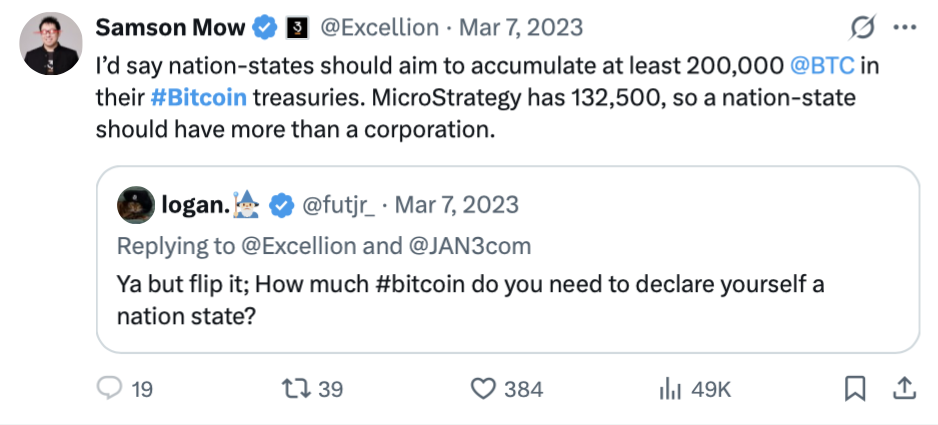
“That could have been selling gold to accumulate Bitcoin,” Mow explains. The US government holds the largest gold reserve in the world, with 8,133 metric tons in its possession. Mow points out that retail investors are already rotating out of gold ETFs and into Bitcoin ETFs.
“The time to do some sort of budget-neutral acquisition, disposing of an inferior asset for a superior asset, is closing very rapidly.”
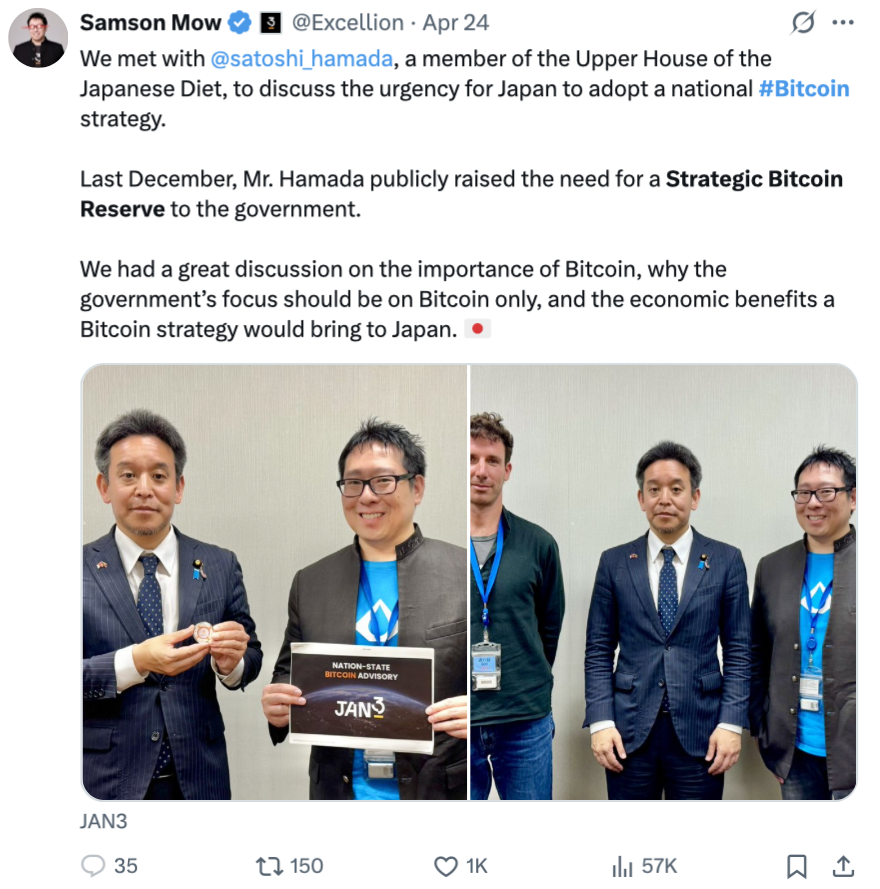
Mow is perhaps the foremost proponent of nation-state Bitcoin adoption, and has been pursuing the goal vigorously since he stepped down as chief strategy officer at Adam Back’s Blockstream in March 2022 after five years with the company.
In April that year, the University of British Columbia graduate launched his Bitcoin advisory firm JAN3. The name “JAN3” is a reference to Jan. 3, 2009, which is the day that Bitcoin’s pseudonymous founder, Satoshi Nakamoto, mined the first block — also known as the “genesis block” — of Bitcoin.
Mow has been visiting nations like Japan, Colombia, Costa Rica and Mexico to engage with governments about the benefits of holding Bitcoin.
JAN3 offers strategies and guidance on everything from exchange operations and wallet development to mining infrastructure.
Mow says the Trump administration is racing against the clock to secure its Bitcoin strategy as the next administration “can basically dismantle everything that was put forth, so everything can be rescinded that Trump has done so far.”
“That’s why I think it’s of the utmost importance to have an accumulation strategy running before he leaves office.”
“What we see at JAN3 is that in most countries, when a new party or administration comes to power in the first year, they don’t really want to do anything,” he says.
Mow says it’s only really in the second and third years that they’re capable and able to do things, as they’re reluctant to rock the boat in an election year.

That said, Mow believes that “maybe it’s okay” if current vice president JD Vance takes over. At the Bitcoin2025 event in Las Vegas, Vance made bullish comments, saying that 50 million Americans currently own Bitcoin, and he believes it won’t be long before that number doubles to 100 million.
Mow is one of the best-known Bitcoiners in the world. Even many normies would recognize him from his appearance on HBO’s controversial documentary Money Electric, which speculated that software developer Peter Todd might be Satoshi Nakamoto.
However, Mow says that kind of visibility has its downsides.
“If I could have done it all over again, I probably would not have been like sort of a personality in Bitcoin,” Mow says.

It’s a bit late for that, with 346,000 followers for his X account and a leading role in the “block wars” that tore apart the Bitcoin community between 2015 and 2017 and led to the Bitcoin Cash fork.
“I kind of realized it was too late [to be anonymous] in 2017, so the best I could do now is to make Bitcoin more ubiquitous,” he says.
Mow says the danger of being known as a wealthy Bitcoiner means “it’s not as fun going out anymore.”
Read also
When asked about his safety with crypto-related kidnappings on the rise, Mow says it’s a real concern, and he usually has “some security details” arranged whenever he appears in public.
Which is another good reason to turn the world’s population onto Bitcoin.
“If everyone has Bitcoin, then it’s like, no, everyone is less of a target. If it’s just money like everybody has, then it’s less of a novelty that you go and try to rob someone of their Bitcoin.”
Mow says that people shouldn’t worry about missing buying Bitcoin for pennies now that it’s worth north of $100,000.

“I think people feel like they missed the boat because they didn’t buy Bitcoin at $1, but they often forget that the people who bought Bitcoin at $1 also spent it at $1 or $2,” Mow says.
“Even people who bought it at $10,000, some of them probably sold it at $100,000, thinking, Oh, we made a great profit,” he says.
Mow says buying Bitcoin now is still early, because the “trend is basically exponential. “If you look at Bitcoin’s trajectory from zero to 16 years, it is a very steep curve going up,” he says.
“A lot of people just don’t think like I am going to become very wealthy because Bitcoin is going to add another zero or two zeros, and if I have half a Bitcoin, I might have $5 million in two years,” Mow says.
“They just don’t think that’s possible. But that’s exactly what is going to happen,” he says.
Mow says there are still two major things most people misunderstand about Bitcoin.
“The first thing that people misunderstand or fail to understand is the ultimate scarcity of Bitcoin,” he says.
“There are only 21 million, and you already see Saylor scooping up a massive proportion of that,” Mow says. Saylor holds 580,250 Bitcoin, worth approximately $61.33 billion at the time of publication, according to Saylor Tracker.
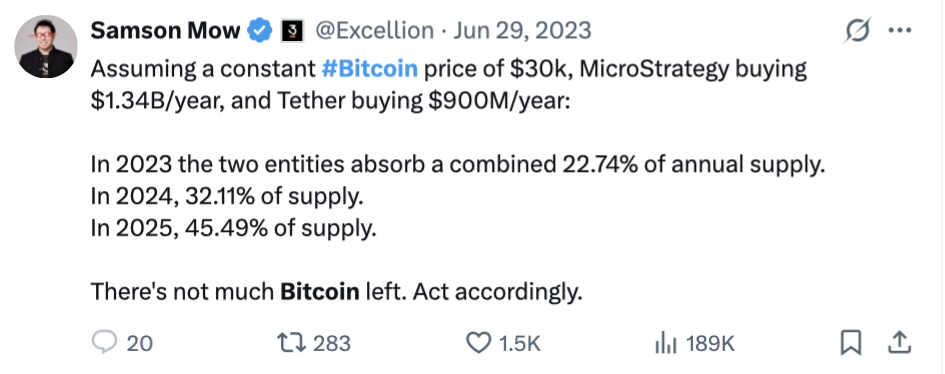
The second big misconception is that Bitcoin’s shady money for the dark web. “It is no longer some experimental thing that, you know, people use to buy drugs with it is now an asset, a reserve asset of countries,” he says.
Read also
Mow explains that these “two critical facts” combined with the accelerating rate of Bitcoin adoption mean it is only a matter of time before there is really nothing left.
“So the window of opportunity to buy Bitcoin, I think, is probably one to two years, maybe three years, and then people will just be earning Bitcoin.”
Mow believes Bitcoin’s current price doesn’t yet account for the possibility of rapid nation-state adoption and the race between growing numbers of corporate treasuries to accumulate it.
“It definitely feels like current price action levels are not matching the expectation of what would happen as all these players come in,” Mow says.
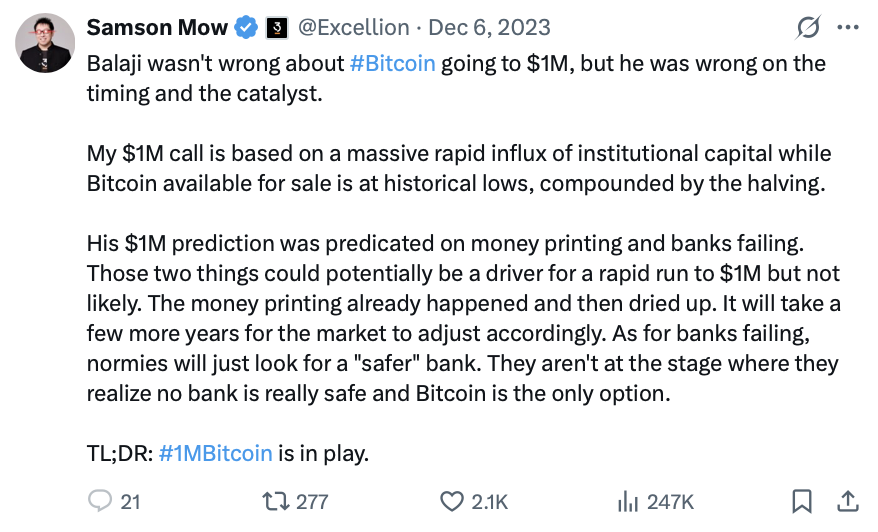
“It just seems like a big price movement up is inevitable before the end of the year,” he says.
Mow says a $1 million Bitcoin price tag “is a given at this point, maybe this year, maybe next year.”
“I think I see more and more price predictors throwing out the 1 million number because there’s no longer, you know, career risk.”
He says that once other countries start jumping on board with Bitcoin, all the old price historical data won’t matter anymore because Bitcoin will be on a new level of adoption.
“What happens when Pakistan wants to buy? What happens when China decides to buy?”
When asked about the most significant risk to Bitcoin in the coming years, Mow points to the ethos of the Bitcoin community itself. He points to the recent “raging” debate about whether Bitcoin is a database or money.
“This goes down to the OP_Return debate that’s been raging for the past, you know, a few weeks, but has been an ongoing point of contention for most of Bitcoin lifetime, starting in 2014,” he explains.
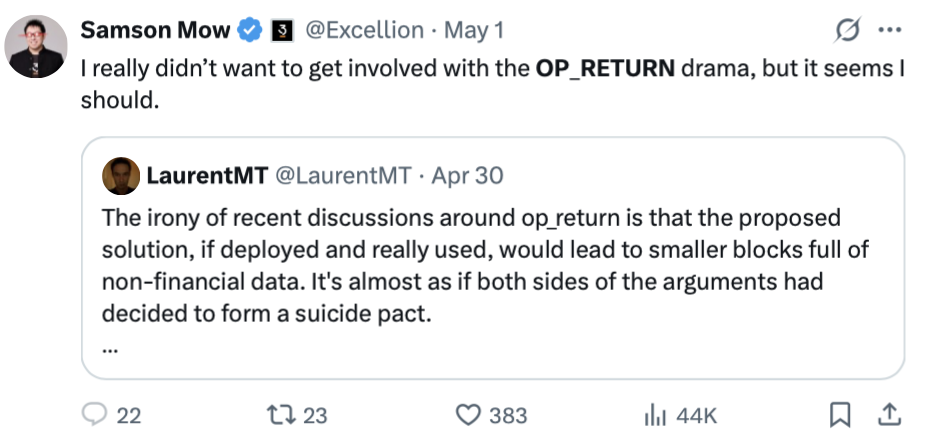
The debate was reignited in April, when Peter Todd, the man HBO linked to being Satoshi Nakamoto, proposed that data size limits should be removed using OP_Return, which is a special type of Bitcoin transaction output that allows storing small amounts of data on the blockchain.
“The restrictions are easily bypassed by direct substitution and forks of Bitcoin Core,” Todd said on GitHub.
Bitcoin core developer Greg Saunders said the original limit is no longer effective as people found ways around it, such as using fake output addresses, which are actually worse for the network, while some mining services were already ignoring the limit.
On May 5, Saunders announced the developers would be going ahead with it. “Bitcoin Core’s next release will, by default, relay and mine transactions whose OP_RETURN outputs exceed 80 bytes and allow any number of these outputs,” Saunders said on Github.
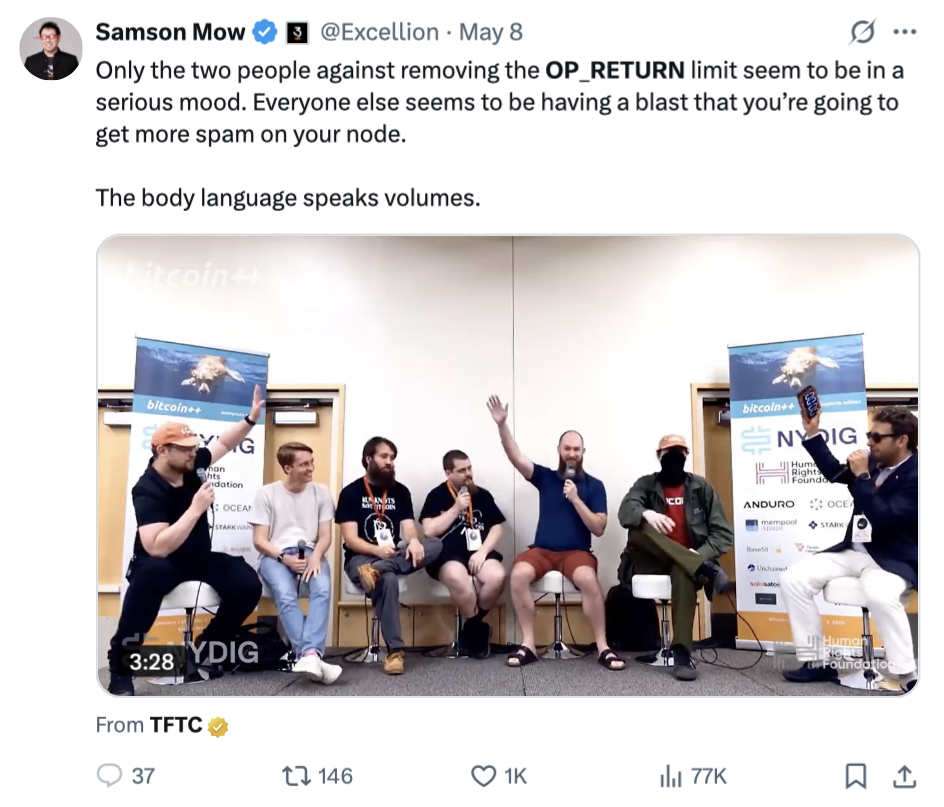
Many in the Bitcoin community are against the idea, including Mow, who says it’s a risky mindset for Bitcoin’s future if people start thinking of it as just a database or that it’s meant for anything other than being money.
“I think we run the real risk of Bitcoin failing because you’re no longer using Bitcoin as money but as a data store, and that upends the entire system of how Bitcoin works,” he says.
But on another danger to Bitcoin, Mow isn’t too worried about the threat quantum computing poses. “I think it is a real risk, but the timeline is probably still a decade away, and I would say everything else will fail before Bitcoin fails,” Mow says.
“National security, existing commerce systems, everything that requires encryption, will fail before Bitcoin fails,” he adds.
BitcoinCryptocurrenciesUnited States
Read also
Meet the hackers who can help get your crypto life savings back
by
Felix Ng
8 min
July 10, 2024
Lost crypto password? These are the hackers who have made a living getting yours back.
Search
RECENT PRESS RELEASES
Related Post






